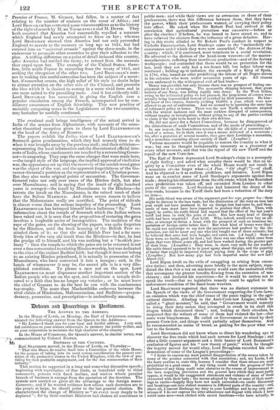The overland mail brings intelligence of the actual arrival in
India of the armies from Afghanistan, with accounts of the some- what theatrical reception given to them by Lord ELLaNnonormi at the head of the Army of Reserve.
The papers exhibit the Indian view of Lord ELLENBOROUGH'S Somnath gates proclamation, which they had scarcely time to do when it was brought away by the previous mail; and their criticism— representing the local information and the discontented official inte- rests of India, whose emoluments are touched by a retrenching Gover- nor—is unsparing. They urge the same charges that were made here, —the turgid style of the language, the implied approval of vindictive war, the appearance set up that the recovery of the sandal-wood gates was the object of the war, and the apparent forgetfulness of the Go- Vernor- General's position as the representative of a Christian power. But they also make original points of accusation. The Governor- General rules not only over races of the Hindoo faith, but also over Mussulmans; and in saying that the insult of eight hundred years is avenged—the insult by Mussulmans to the Hindoos—he retorts the insult on the Mussulmans, in the ruined tomb of their hero the Sultan MAnmoun. And there seems reason to believe that the Mahometans really are mortified. The point of ridicule is almost worse than the serious impolicy of the proceeding. Lord ELLENBOROUGH has betrayed himself into a ludicrous "fix." From information about the temple of Somnath which the Indian writers have raked out, it is seen that the proposition of restoring the gates involves a laughable series of incongruities. The tradition of the rape of the gates, on the showing of the papers, was quite forgotten by the Hindoos, until the book learning of the British Peer re- minded them of it ; so that the said British Peer had a far more lively idea of the very old insult than the Hindoos—in fact, he had the grudge all to himself, and his was nothing but a " bcokish jea- lousy " : then the temple to which the gates are to be returned is not even a fane consecrated to existing Hindoo worship, but was dedicated to the rites of the extinct Budhist faith: but though it does not belong to an existing Hindoo priesthood, it is actually in possession of the Mussulmans, who have converted it into a mosque ; and, in the bands of whomsoever it may be, the sacred pile is in a very dila- pidiated condition. To please a race not on the spot, Lord F.T.T.v.paloaot-crt must dispossess another important section of the Indian people who are on the spot, and reinstitute a temple dedi- cated to a faith that has no longer any votaries ; or he must leave the chief of Guzerat to do the best he can with the cumbersome toy-trophy. The more than Macheathlike embarras between the rival claims of Hindooism, Mahometanism, and Budhism—prepon- derancy, possession, and prescription—is undoubtedly amusing.


























 Previous page
Previous page